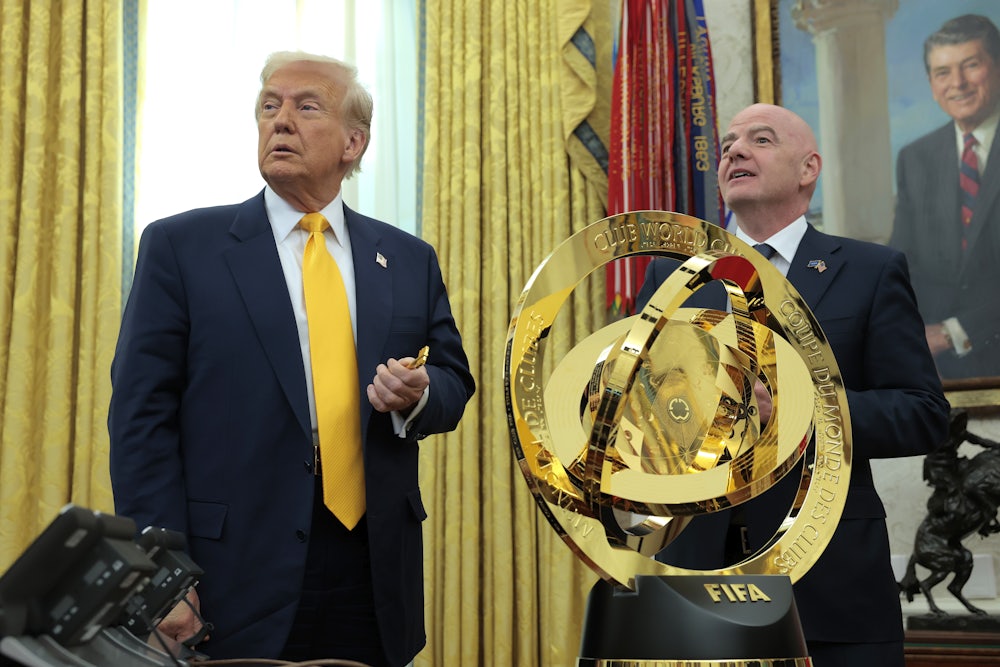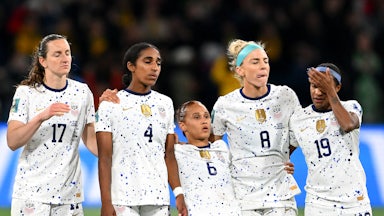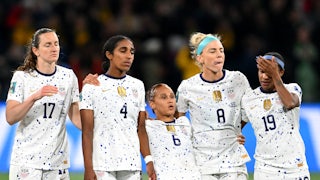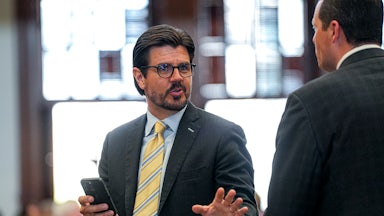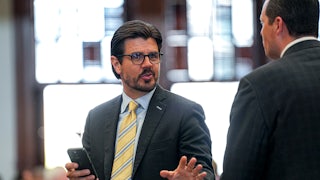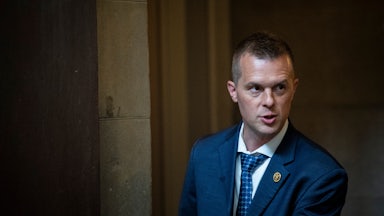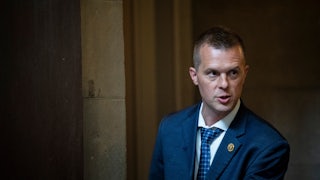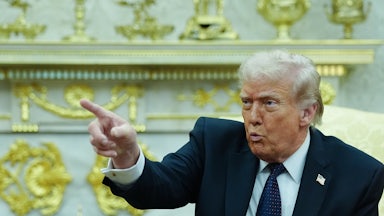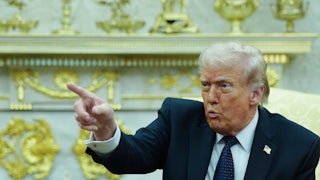Earlier this year, President Donald Trump designated himself chairman of the U.S. task force organizing next year’s World Cup in North America. His reign officially kicked off amid a hail of boos on July 6 in New Jersey at the Club World Cup finale between Chelsea and Paris Saint-German—a precursor to the big event in 2026.
As with most things associated with Trump, his participation in FIFA’s minor canon came with a generous helping of slapdash corruption. Trump had already helped himself to the trophy meant for the tournament’s winners, claimed as a piece of bric-a-brac to display in the Oval Office, so Chelsea’s triumphant squad had to be presented with a replica of the original. (The president insisted the winners’ trophy was gifted to him by FIFA.) The kleptomania didn’t end there: Trump was filmed tucking away a championship medal in the inside breast pocket of his suit jacket at the event.
He also hogged the victory stage during the Chelsea players’ celebration in front of the fans at MetLife Stadium. Gianni Infantino, head of the international soccer organization Fédération Internationale de Football Association, or FIFA, was seen on camera attempting to usher the president from the platform, but Trump wasn’t budging. The lone outsider stuck fast to the stage as the players around him leapt into the air to celebrate their win. He was later erased from one of the team shots posted on social media.
Chelsea midfielder Cole Palmer, who scored two of the team’s three goals for the title win, said later he was “confused” by the lingering Trump. “I knew he was going to be here, but I didn’t know he was going to be on the stand when we lifted the trophy,” Palmer added.
Better get used to Trump hanging around. The president will now lord over arrangements hammered out in offices in his own Trump Tower in Manhattan for the 2026 World Cup taking place in the United States (13 cities), Canada (two cities), and Mexico (three cities). The 2026 iteration of the Cup will debut its new, expanded format and will include a record 48 teams and 104 games.
Trump named as the executive director of his new World Cup task force former small-time pro golfer and short-time Republican candidate for New York governor Andrew Giuliani, 39, son of onetime New York Mayor Rudy Giuliani, a main defender of Trump’s lie that the 2020 election was rigged. The task forces will be part of Kristi Noem’s Department of Homeland Security.
Trump Tower enthusiasts will recognize that this is a full-circle operation. Ten years ago, an investigation into the biggest bribery scandal in soccer history was launched in the exact same building, as FIFA general secretary Chuck Blazer, to save himself, suited up with a wire for the FBI to implicate his cronies in the sports federation. Mike Gaeta, a founder of international investigation and consulting firm SI Global Partners, was a top FBI investigator in the case who launched the probe. In an interview, he characterized the crackdown as a major “slap upside the face of those out to game the system.”
A decade later, FIFA is back in the building. And with it comes millions of dollars—involving security, sponsorships, sports gear, and memorabilia—that has been and is being negotiated. Trump, whose private companies continue to profit from deals with corporations and nations even as he serves in the White House, is calling the shots in the U.S.
What could possibly go wrong?
Besides providing a fresh opportunity for profit and kickbacks, the World Cup in the U.S. promises politically to be a jarring mix of global cooperation, talented athletes from around the world, and the Trump administration’s “suited and booted” ICE men poised to pounce on people attending the matches from around the world. It threatens to be a modern-day taste of Hitler’s 1936 Summer Olympics, when Germany hosted the global games while aiming at the same time to highlight Nazi domination.
A decade ago, the FBI’s investigation resulted in the indictment of nine FIFA officials and five corporate executives by the U.S. Department of Justice—for corruption, racketeering, and money laundering, among other charges—in a massive bribery and kickback scandal linked to awarding contracts and choosing World Cup venues in South Africa (2010), Russia (2018), and Qatar (2022). The number of indicted FIFA officials and corporate representatives later grew to some 40 people. Most confessed, were convicted, or died before court actions concluded.
U.S. prosecutors accused individuals (and collaborators) of FIFA’s exclusive 24-member executive committee of choosing World Cup venues and awarding contracts influenced by hundreds of millions of dollars in bribes. According to the indictments, the head of FIFA’s regional Confederation of North, Central America and Caribbean Association Football, or CONCACAF, Blazer’s boss Jack Warner, raked in $10 million just for voting for South Africa to be a World Cup venue, a fraction of his total take. Warner, who lives in Trinidad, has denied all the charges and has stayed out of the U.S. since his indictment.
Warner also picked Qatar to host the 2022 World Cup. (Blazer, who lived in Forest Hills, Queens, as a boy and New Rochelle, New York, later on, told confidants he did not, since the U.S. was vying to be the World Cup venue the same year.) Qatar had no stadiums adequate for World Cup play when its bid was accepted. As it fulfilled its commitments, hundreds of immigrant workers lost their lives in accidents building the stadiums and other projects for the event—a reality that Qatar’s own World Cup chief has admitted. Human rights organizations say thousands died leading up to the Cup. Staging the World Cup in Qatar cost an estimated record-busting $220 billion.
By the time federal agents confronted Blazer outside Trump Tower in November 2011, he had raked in his own multimillion-dollar income, helping himself to at least a 10 percent cut of every deal he made, and an additional untold fortune under the table throughout his 11-year reign as CONCACAF general secretary. He paid no taxes for 20 years, Gaeta noted, a fact leveraged by agents to force his cooperation in their investigation.
He turned out to be the linchpin in the FBI’s massive crackdown on the sports organization.
Gaeta credited Blazer with nailing down needed information that ultimately resulted in the dramatic arrests by Swiss authorities of FIFA officials outside the Baur au Lac Hotel in Zurich in May 2015. Like the mobster wiseguys Gaeta had worked with, he said Blazer was “practical, getting the most benefit as quickly as possible” while working with the FBI to stay out of prison. “At some point he started to take to the work,” Gaeta added.
It was Blazer, who got his start in the sport coaching the soccer teams of his son and daughter when they were children, who decided to rent the seventeenth floor of Trump Tower for CONCACAF offices when he became general secretary in 1990. He also lived in the building in a $18,000-a-month, three-bedroom apartment on the forty-ninth floor with a view of Central Park, with a second $8,000-a-month, one-bedroom apartment rented exclusively for his cats. Trump Tower was a symbol to Blazer that he had arrived.
Trump had nothing to do with FIFA or CONCACAF then, but the crafty, ebullient Blazer—who tipped the scales at 450-plus pounds and needed a motorized mobility chair to get around and a breathing apparatus at night—was friendly with his neighbor and building owner, who lived in Trump Tower’s two-story penthouse. Both were Queens men with a chip on their shoulder about snooty Manhattan society. Trump offered Blazer open invitations to his various beauty pageants, and Blazer took him up on them.
Trump filmed his lone TV ad for his infamous Trump “University” offering pricey classes on business and real estate in Blazer’s apartment in 2010. Trump touted his enterprise in a scene outfitted to look like an academic office with shelves of books and a giant globe. Neither Trump nor Blazer had any books to speak of to complete the look, so they had to be borrowed from a law firm, according to Mary Lynn Blanks, Blazer’s longtime romantic partner. A $25 million settlement was later paid in 2017 to settle claims by several “university” clients that they were subject to high-pressure sales techniques and lies about the money they would make with Trump classes.
The money to be made and expended in the U.S. World Cup games is unclear. A FIFA accounting mashing together figures for 2023–2026 reported a budget for the 2026 Word Cup of $3.75 billion, though specific expenses weren’t detailed. Listed revenue apparently for all FIFA events included some $4.2 billion in broadcasting rights and $3 billion in hospitality and ticket sales. Cost estimates for Vancouver alone for its World Cup games are already edging close to half a billion U.S. dollars.
Expenses may be divvied up among hosting nations and cities and FIFA, but the organization’s budget report doesn’t detail how the burden will be shared. FIFA did not respond to repeated requests to provide the information.
Nor did the White House provide any figures, including costs like Giuliani’s salary, the number of task force staffers or a budget for them, or how much rent the Trump Organization will be paid for the World Cup offices. Trump’s task force will be responsible for all World Cup “logistics and security,” according to his executive order establishing the group.
Payments to cover World Cup expenses by U.S. hosting cities, which will include large expenditures on police and other security and emergency services, will come at a time when states will be struggling to make up for significant federal cuts in Medicaid and federal education and health services. Trump beefed up his “big, beautiful bill” with a $625 million fund to help pay for “safety and security” in the host cities—Atlanta, Boston, Dallas, Houston, Kansas City, Los Angeles, Miami, East Rutherford (for New York and New Jersey), Philadelphia, Santa Clara (for the Bay Area), and Seattle. The money was allocated just as a Houston World Cup official warned that the city was “teetering in terms of being close to breaking even” for hosting one of the games.
FIFA comes out way ahead in stadium agreements, according to one recently obtained by The New York Times. It will take full control of New Jersey’s MetLife Stadium, 30 days before the opening World Cup match until seven days after the tournament, according to the deal. The city and stadium, meanwhile, shall “bear all the costs and expenses incurred,” including “providing police escorts” for teams, referees, and FIFA head Infantino and his delegation. The city is also expected to “provide medical services and fire protection around matches” and any required FIFA offices free of charge.
In return for local costs, FIFA has optimistically predicted the World Cup could boost the “global GDP” by $47 billion and create hundreds of thousands of jobs.
But there have been warning signs that next year’s event won’t be quite as successful as touted. The recently concluded Club World Cup, intended to goose interest in the bigger tournament to come, was far less than the windfall that was hoped for, with discounted and empty seats and complaints about the extreme heat during some of the matches. The World Cup will play out next year during the same hot summer months.
The Cup will also be facing stiff headwinds created by the growing global animosity toward America, the boycotts triggered by Trump’s tariffs, and his constant battery of insults directed at other countries and world leaders. The world’s disregard for Trump has decimated tourism to the United States. On top of that, sports fans from around the world will also have to worry that they could be detained en route to the U.S. or otherwise swept up in anti-immigrant raids by masked ICE agents and locked in detention cages until their details are sorted out.
In addition, countless sports fans hail from the 12 countries whose travelers have been banned from entering the U.S. as of June 9, in an executive order signed by Trump. The order includes an exemption for athletes, coaches, and support staff and “immediate relatives” traveling to the Cup or to the 2028 Olympics in the U.S.
Despite problems, Trump could profit mightily from the Cup now and in the future if only by promoting his name and brand and nurturing and exploiting relationships with FIFA and sports companies and event officials. He could cash in on sports memorabilia, like issuing a World Cup meme coin from his crypto company. Infantino noted in a visit with Trump earlier this year at the White House that he might be interested in developing a “FIFA coin.” Trump noted: “That coin may be worth more than FIFA in the end.”
Qatar’s aim in hosting the Cup in 2022 was part of its “sportswashing” strategy, a bid to boost the reputation of the regime to become a player on the global scene. It worked as intended, particularly with the leader of the United States. Qatar is now supplying a $400 million “flying palace” to a grateful Donald Trump to use as his Air Force One. (“Why wouldn’t I accept a gift?” he asked in a Fox television interview.) And the president’s family is currently doing business with a Qatari government–owned company to build a luxury golf resort in the country.
Saudi Arabia has been chosen to host the Cup in 2034, despite scathing criticism over its multiple human rights violations and the murder-dismemberment of Washington Post columnist Jamal Khashoggi inside the Saudi Embassy in Istanbul seven years ago. Trump staunchly defended Saudi Crown Prince Mohammed bin Salman during his first administration, despite a determination by America’s own intelligence network that bin Salman had ordered Khashoggi’s murder.
“I saved his ass,” Trump later boasted about his defense of the prince, amid the outcry over Khashoggi’s killing in an interview with Washington Post author Bob Woodward. “I was able to get Congress to leave him alone. I was able to get them to stop,” Trump said, Woodward recounted in his book Rage.
Just months after the end of the first Trump administration, the Saudi sovereign wealth fund—over objections by some of its board members—invested $2 billion in a financial investment operation launched by Trump’s son-in-law and onetime White House aide Jared Kushner, the first such business Kushner had ever started. The Trump Organization also maintains a strong relationship with the global Saudi golf tournament operation LIV, which is part of that country’s early sportswashing effort.
Despite such recent developments, Gaeta is convinced the dramatic FIFA busts in Zurich 10 years ago and subsequent cases sparked by a powerful FBI investigation sent a strong message to “extremely wealthy international businessmen abusing the system and making the rules for themselves” that they “can’t do everything they want, and there are consequences.”
That’s “still in the back of their minds,” Gaeta said. We shall see.
